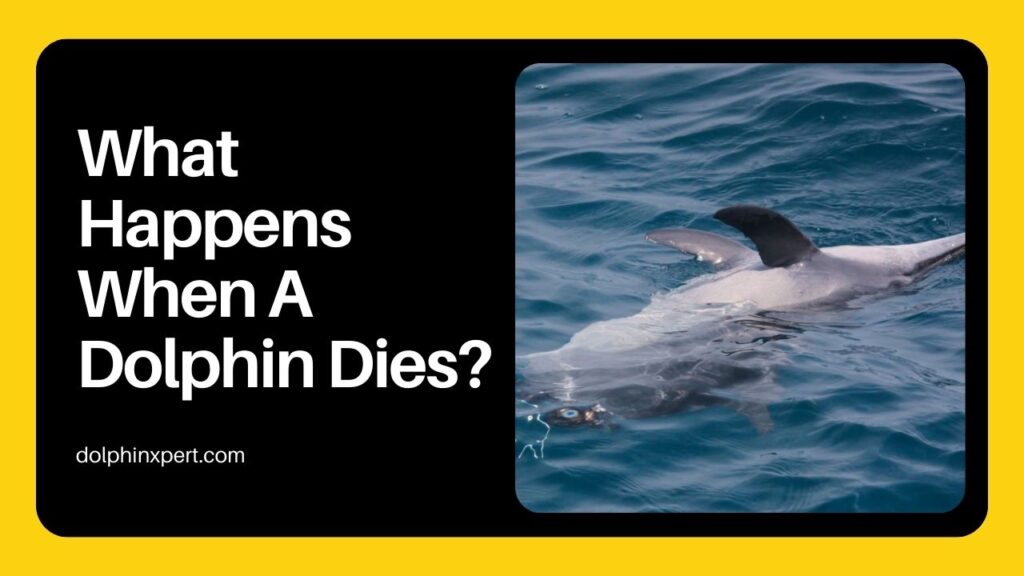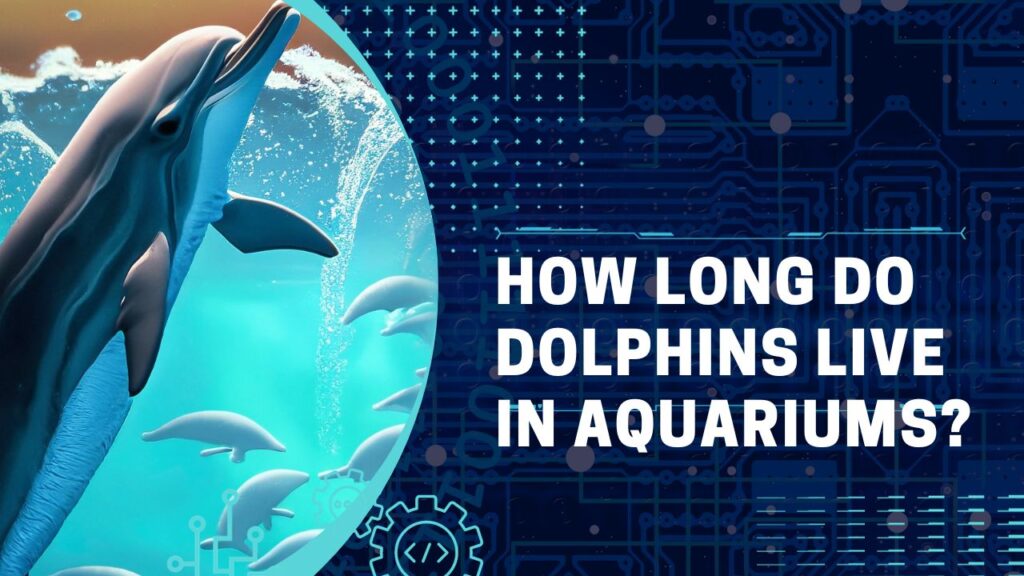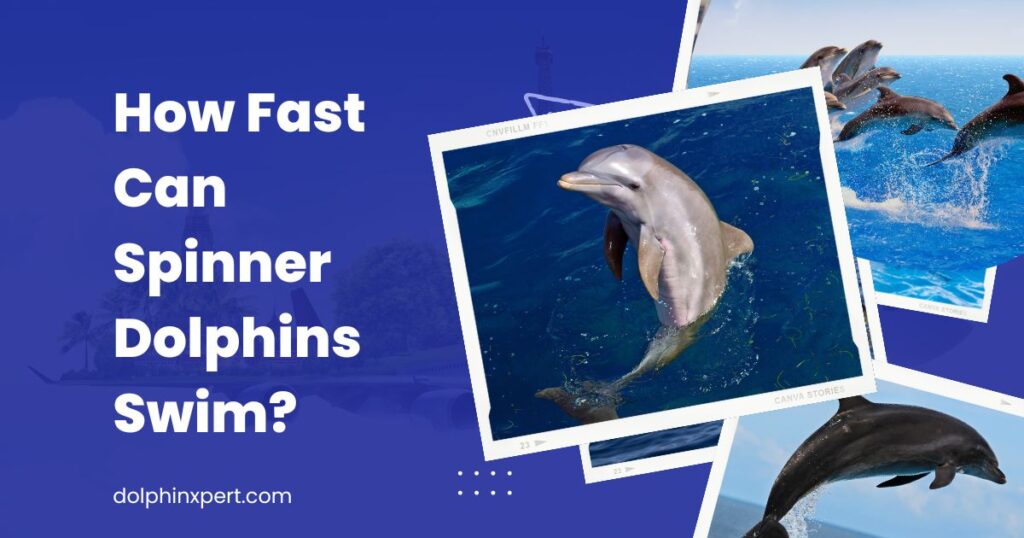Last updated on December 21st, 2023 at 02:34 pm

What Happens When A Dolphin Dies? When a dolphin dies, its body typically sinks to the bottom of the ocean.
However, in some cases, other dolphins in the pod may stay with the deceased dolphin for a short period of time, seemingly mourning or showing some form of social behavior.
Dolphins have long captured our hearts and minds with their playful demeanor and extraordinary intelligence. Even though these animals are magnificent, they are nevertheless a part of the life-death cycle.
This page will discuss how dolphins die naturally, what happens to them after they pass away, and even some of their thoughts on death.
Table of Contents
- 1 What Happens When A Dolphin Dies?
- 2 How Do Dolphins Die Naturally?
- 3 How Do Dolphins Die Of Old Age?
- 4 Do Dolphins Grieve For Their Dead?
- 5 Are Dolphins Aware Of Death?
- 6 Do Most Dolphins Die By Drowning?
- 7 At What Age Does A Dolphin Die?
- 8 How Many Stages Are In A Dolphin Life Cycle?
- 9 What Is The First Stage Of A Dolphin Life Cycle?
- 10 Frequently Asked Questions (FAQs)
- 11 Conclusion
What Happens When A Dolphin Dies?
Usually, a dolphin’s body descends to the water floor upon death. But occasionally, other dolphins in the pod will spend a little amount of time with the dying dolphin, acting as though they are grieving or exhibiting some other kind of social behavior.
Dolphins have occasionally been seen pushing a deceased companion to the surface in order to prevent it from sinking.
To properly comprehend the nature of dolphin death rites, further research is necessary as this behavior is not well understood. [What happens when a dolphin dies?]
While some experts speculate that this activity could be an attempt to keep the carcass afloat so that other dolphins can examine it, others think it could be a kind of grief.
In captivity, dolphins usually have their bodies buried or cremated. Nonetheless, there are displays at certain aquariums and marine parks where guests can view the skeletons of deceased dolphins.
Here is a more detailed breakdown of what happens to a dolphin’s body after it dies:
- Initially, the body will float on the surface of the water. This is because the lungs are still filled with air.
- Over time, the body will start to decompose and sink to the bottom of the ocean. This process can take anywhere from a few days to a few weeks, depending on the conditions.
- At the bottom of the ocean, the body will be scavenged by other marine animals, such as sharks, crabs, and fish.
- Eventually, the body will be completely decomposed and its bones will be scattered across the ocean floor. [What happens when a dolphin dies?]
Dolphin bones are very dense and can last for hundreds or even thousands of years. This is why whale bones are often found on beaches and in other coastal areas.
How Do Dolphins Die Naturally?
When dolphins near the end of their lives, they pass away from a variety of natural causes just like any other living thing. Despite their extraordinary resilience, they are yet susceptible to life’s challenges.
Disease, aging, predation, and even environmental issues like pollution and climate change are common natural causes of dolphin deaths.
Illness
Dolphins are susceptible to a variety of illnesses that have the potential to be lethal over time, just like humans. These illnesses might range from parasitic infestations to bacterial and viral infections.
Unfortunately, some illnesses can worsen and cause these magnificent animals to pass away. [What happens when a dolphin dies?]
Old Age
Dolphins age in the same way as people do. Their general health declines as people age and their bodies become more vulnerable to age-related ailments.
They may eventually become less able to thrive as they age, which will cause them to pass away naturally.
Predation
Dolphins are incredibly smart and nimble, yet they are not unbeatable. Predators, especially sharks and killer whales, pose a hazard to them.
Dolphins are prey to these top predators, especially if they are sick or elderly and so feeble or susceptible. [What happens when a dolphin dies?]
Environmental Elements
Sadly, dolphins’ habitat poses a number of hazards to them. The fragile balance of their ecology can be upset by things like pollution, climate change, and overfishing.
Dolphin populations may suffer from adverse effects, including habitat degradation, food scarcity, and exposure to hazardous substances, which may result in dolphins dying young.

How Do Dolphins Die Of Old Age?
The group of aquatic animals known as cetaceans, which also includes whales and porpoises, includes dolphins.
Many species of cetaceans can live for several decades or even longer, as they generally have long lives. Not unlike other animals, dolphins can survive between 30 and 50 years in the wild.
The subject of how dolphins age out of the water has no single, conclusive explanation. Nonetheless, several variables are believed to have a role in the aging process and eventual demise of dolphins, such as:
Decline in organ function: Dolphins’ organs begin to perform less well as they get older. Numerous health issues, including liver, renal, and heart disease, may result from this.
Immune system weakness: The immune system defends the body against illness and infection. Dolphins are more prone to disease as they get older because of a weakened immune system. [What happens when a dolphin dies?]
Injury risk: Compared to younger dolphins, older dolphins have a higher chance of suffering an injury. This is because their strength and agility may have decreased over time.
Toxin accumulation: Dolphins’ bodies may get contaminated with poisons over time. These poisons have the potential to kill people as well as harm tissues and organs.
See Also: Do Dolphins Eat Pufferfish? Toxic Tidbits
Do Dolphins Grieve For Their Dead?
Members of the dolphin pod have been seen participating in what appear to be grieving customs when a dolphin passes away.
On the other hand, dolphins—which are known for having high emotional intelligence—have been seen acting in ways that seem to indicate a close bond with their departed relatives. [What happens when a dolphin dies?]
When a dolphin passes away, they may swim close to the dead dolphin, make melancholy sounds with their voices, or even touch and nuzzle the corpse. Experts now believe that dolphins can actually feel loss and grief as a result of these discoveries.
Are Dolphins Aware Of Death?
Research indicates that dolphins may be somewhat aware of mortality, albeit we are unable to determine the entire scope of their understanding.
Because death is such a complicated idea, scientists are still trying to figure out how animals interpret it.
Their treatment of deceased pod members and their capacity to discern individual absences point to a level of comprehension that goes beyond simple instinctive responses.
Do Most Dolphins Die By Drowning?
No, drowning is not how most dolphins pass away. Dolphins are mammals that breathe air, just like people do.
They have developed defense mechanisms against drowning because they are acclimated to life in the water.
They may, however, pass away from other causes, including illness, predators, or external circumstances. [What happens when a dolphin dies?]
See Also: Do Dolphins Die By Drowning? Busting Myths
At What Age Does A Dolphin Die?
Depending on the species, dolphins die at different ages. It is generally the case that larger animals live longer than smaller species.
For instance, an orca, commonly called a killer whale, can live more than 90 years. in the wild, whereas a common bottlenose dolphin can only survive for 40 years1.
Dolphin lifespans are also influenced by elements like individual health, pollution exposure, diet, and habitat quality.
It is important to remember that these estimates are based on averages and that both populations and individuals may vary significantly from one another.
How Many Stages Are In A Dolphin Life Cycle?
There are multiple distinct stages in the dolphin life cycle, each with special traits of their own. These phases cover a range of life events, from conception to adulthood, and come to a close with natural death. [What happens when a dolphin dies?]
The life cycle of dolphins can be broadly classified into four stages: prenatal, infancy, adolescence, and adulthood.
Prenatal Stage
A dolphin’s development inside its mother’s womb is known as the prenatal stage.
This chapter, which lasts for around 12 months2, is fascinating because it shows how an embryo develops into a mature dolphin.
In order to ensure the healthy development of the growing fetus, the mother feeds it throughout this stage. [What happens when a dolphin dies?]
Infancy Stage
The calf is born and goes into the infancy stage after the gestation period. The calf mostly depends on its mother during this period, which usually lasts one to two years, for nutrition, protection, and the acquisition of vital survival skills.
During this time, mother dolphins are exceptionally caring, teaching their young how to swim, hunt, and interact with other pod members.
Adolescence Stage
Dolphins enter adolescence once the neonatal period ends. Calves go through several years of this age where they learn to be independent and adaptable.
Young dolphins start to investigate their environment, hone their hunting skills, and form relationships with people outside of their immediate family.
Adolescent dolphins may also depart from their birth pod at this time in order to join or create other pods. [What happens when a dolphin dies?]

Adulthood Stage
The final stage in a dolphin’s life cycle is adulthood. Adult dolphins have reached sexual maturity, typically between 5 and 14 years of age3, depending on the species.
They actively participate in mating, reproduction, and the continued survival of their species. It is in this stage that dolphins contribute to the perpetuation of their lineage and the maintenance of their ecosystems.
What Is The First Stage Of A Dolphin Life Cycle?
The prenatal stage of a dolphin’s life cycle begins upon conception and lasts for the duration of the gestation period. [What happens when a dolphin dies?]
It is a breathtaking chapter that shows how the wonder of life develops from an embryo to a fully formed dolphin fetus.
The dolphin fetus goes through an amazing procedure in the mother’s womb to be nursed and sustained during the prenatal stage.
The oxygen and essential nutrients required for the fetus’s growth and development are supplied by the mother dolphin.
The fetus is given the nutrition it needs for a healthy passage into the world thanks to this complex procedure.
Frequently Asked Questions (FAQs)
Can Dolphins Die From Human-Related Causes?
Regretfully, the answer is indeed. Dolphins may be at risk from a number of human-caused problems, including pollution exposure, collisions with vessels, and entanglement in fishing gear. The mortality rates of dolphins can be influenced by several man-made variables.
Do Dolphins Have An Instinct For Self-Preservation?
Indeed, self-preservation is a fundamental tendency for dolphins. They are able to recognize dangers and adjust their behavior accordingly, running from predators or staying out of dangerous circumstances, for example.
They can better navigate their surroundings and improve their chances of survival because to this survival instinct. [What happens when a dolphin dies?]
Are There Any Conservation Efforts To Protect Dolphin Populations?
Yes, a large number of global conservation efforts and organizations work to save dolphin populations and their habitats.
Among the initiatives are campaigns to create protected marine regions, push for stronger laws governing fishing methods, and increase public understanding of the value of environmental preservation.
How Can Individuals Contribute To The Well-Being Of Dolphins?
People can contribute positively to the well-being of dolphins by endorsing eco-tourism programs that put the welfare and conservation of dolphins first.
Dolphins and other marine animals can benefit from a healthier marine environment, which can be achieved by cutting pollution, practicing sustainable fishing, and taking part in beach clean-ups.
Conclusion
A dolphin’s death signifies the end of a life full of amazing adventures, relationships, and natural knowledge. Dolphins are susceptible to the cycle of life and death, whether they choose to pass away naturally or because of environmental factors.
Even though infants might not fully understand what death is, they display actions that point to a sense of loss and the ability to grieve.
Let’s acknowledge the value of protecting these amazing creatures’ habitats and guaranteeing their survival for future generations as we continue to learn about and admire them.

Mr. Das, a certified pharmaceutical scientist, holds a Bachelor of Science in Pharmaceutical Sciences and passionately contributes to dolphin conservation as a member of the committee in Bangladesh.


